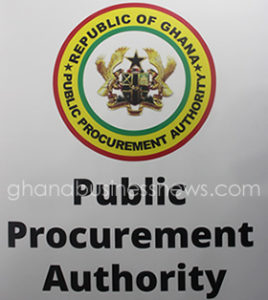Pandora Papers: Ghana PPA fails transparency test
 The Public Procurement Authority (PPA) is by law the entity empowered to negotiate, process and actualize public procurement. Its important role has implications for the management of public finance and where necessary scarce financial resources. The PPA is therefore, by law required to be transparent, particularly so, when events in the past, like the actions of its immediate past CEO, AB Adjei, a man with a well-known history of procurement infractions led to his firing.
The Public Procurement Authority (PPA) is by law the entity empowered to negotiate, process and actualize public procurement. Its important role has implications for the management of public finance and where necessary scarce financial resources. The PPA is therefore, by law required to be transparent, particularly so, when events in the past, like the actions of its immediate past CEO, AB Adjei, a man with a well-known history of procurement infractions led to his firing.
While we worked on the story in the Pandora Papers project, we wrote to the PPA seeking for it to indicate the justifications for the contracts it had approved for Amandi Holdings, the offshore company that has been awarded what looks like ‘sweetheart’ deals.
The Pandora Papers investigation is the world’s largest-ever journalistic collaboration, involving more than 600 journalists from 150 media outlets in 117 countries, including Ghana Business News.
Coordinated by the International Consortium of Investigative Journalists (ICIJ), the investigation is based on a leak of confidential records of 14 offshore service providers that give professional services to wealthy individuals and corporations seeking to incorporate shell companies, trusts, foundations and other entities in low- or no-tax jurisdictions. The entities enable owners to conceal their identities from the public and sometimes from regulators. Often, the providers help them open bank accounts in countries with light financial regulation.The 2.94 terabytes of data, leaked to ICIJ and shared with media partners around the world, arrived in various formats: as documents, images, emails, spreadsheets, and more.
The investigation reveals the secret assets, covert deals and hidden fortunes of the super-rich – among them more than 130 billionaires – and the powerful, including more than 30 world leaders and public officials. The confidential documents also feature a global cast of fugitives, convicts, celebrities, football stars and others, including judges, tax officials, spy chiefs and mayors.
Despite the legal requirement for the PPA to be transparent, it is not, and we had hoped that sending the PPA a written request was an opportunity for the Authority to enhance its transparency, but it didn’t take it.
Curiously, while the PPA did not even acknowledge receipt of our enquiry, seeking clarifications on the justifications for the approvals of some more than a dozen contracts awarded to Amandi over a long period, the PPA instead, informed Amandi about our letter of enquiry. Why a public entity working to protect and serve the interest of Ghanaians would do that is baffling, to say the least.
Part One, Section 2 of the Public Procurement Act 2003 (Act 663) states: “The object of the Authority is to harmonise the processes of public procurement in the public service to secure a judicious, economic and efficient use of state resources in public procurement and ensure that public procurement is carried out in a fair, transparent and non-discriminatory, environmentally and socially sustainable manner.”
The PPA has attempted a certain level of transparency, by publishing some contracts on its website, by using the E-Bulletin approach, but that isn’t sufficient as it doesn’t publish justifications for the contracts, especially those awarded on single source.
Journalists are empowered by the Chapter 12 of the 1992 Constitution to hold public institutions like the PPA to account. Journalists do so by not only covering the public events of the PPA and speeches of its CEOs, but by investigating its activities in the light of the law and in the public interest.
Ghanaians have the inalienable right to know how institutions like the PPA are functioning on their behalf, and it’s the responsibility of journalists to collect the information and put it out to the public. It’s therefore, unacceptable, that public institutions like the PPA would ignore requests for information from journalists about the work they are doing on behalf of citizens- in a democratic system.
While the PPA hasn’t as yet even acknowledged the letter of enquiry, the CEO of Amandi and the Beneficial Owner of the company have responded to the enquiries sent to them in Israel and in Ghana. If private individuals and companies respond to journalists’ enquiries, why would a public entity not respond?
Considering that the immediate past CEO of the PPA was ingloriously removed from office for acting contrary to the expectations of the office he held, it would be in the interest of the PPA, to put its house in order and begin to be transparent as required by the law that set it up.
In the pursuit of transparency and the right to know, the next step to getting the PPA to answer the questions, might be the use of Right to Information Law.
By Emmanuel K. Dogbevi
Copyright ©2021 by NewsBridge Africa
All rights reserved. This article or any portion thereof may not be reproduced or used in any manner whatsoever without the express written permission of the publisher except for the use of brief quotations in reviews.
